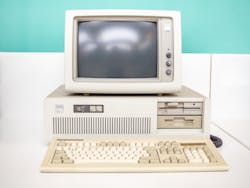When I took my first newspaper job out of college, I walked into a newsroom with rows of IBM AT computers—no mice, giant keyboards, screens that could display in three colors.
I’m not that old. This was a decade after the discontinuation of the AT (the family-owned publication was cheap even by newspaper industry standards), so keeping those aging behemoths running was a massive challenge for the lone IT person.
Off in a corner of the newsroom was one Internet-connected PC. As I was the youngest staffer, it often became my job to look up some random fact for a colleague or editor on AltaVista (Google didn’t exist yet).
Back in the late ’90s, I couldn’t have imagined that decades later, I’d get a call offering me the top editor’s spot at a profitable publication that generates the overwhelming bulk of its revenue on digital products.
Then again, in the late ’90s, I couldn’t have imagined small machine shops that could afford six-axis industrial robots, autonomous guided vehicles delivering goods to assembly lines, Industry 4.0 or 3D-printed titanium brake calipers on the Bugatti Veyron. Like most manufacturers, I’ve had to adjust and adapt to changing times—altering my expectations as entirely new industries have blossomed around me.
I started writing about manufacturing when Nissan built a massive plant in Canton, Miss., just north of Jackson where I was a newspaper business writer. That led to automotive reporting jobs in Louisville, Ky., and Cleveland. After newspapers, I ran Today’s Motor Vehicles for seven years, a magazine focusing on design and manufacturing topics.
Looking back over 20 years of automotive writing, it strikes me that virtually none of the conventional wisdom from the early 2000s applies to today’s manufacturing world—companies can profitably build fewer than 100,000 units of a single vehicle; 30 miles per gallon is possible for a non-hybrid SUV; design iteration to factory floor can take less than five years; hydrogen fuel-cell vehicles are only 10 years from being economically viable (well, that last piece of wisdom has remain unchanged since the 1950s).
That’s the digital revolution in action—advances in material technologies, collaborative design tools, manufacturing execution systems and real-time data systems enabling change. Maybe they’ll someday get us fuel-cell vehicles or Jetsons-inspired flying cars as well.
Writing about manufacturing and actually making things are radically different pursuits, but we have been through many of the same metamorphoses. Journalists, executives and engineers have had to learn new tools and new business models. We’ve had to change how we approach our jobs, interact with customers in new ways and reimagine how to fund our enterprises.
Most of the businesses that I’ve covered have successfully transformed themselves, but I can point to many that couldn’t. I’ve written about the bankruptcies of global telecommunications companies, automotive suppliers, General Motors, Chrysler and a former Cleveland Browns quarterback.
Witnessing those worst-case scenarios strengthens my respect for businesses that have evolved and avoided those fates. Many of you are reading these thoughts in the print edition of IndustryWeek. Print publications still have their place in this Internet of Things world, but they also must transform to survive. I hope to continue making the magazine worth your time and attention. The digital revolution that has decimated newspapers and magazines has also given us tools to produce better print products.
My predecessor Travis Hessman’s promotion within our publishing company has given me a tremendous opportunity. I’m honored to have this chance to witness this industry’s flexibility, and I look forward to hearing your stories of adaptation.
— R
About the Author
Robert Schoenberger
Editor-in-Chief
LinkedIn: linkedin.com/in/robert-schoenberger-4326b810
Bio: Robert Schoenberger has been writing about manufacturing technology in one form or another since the late 1990s. He began his career in newspapers in South Texas and has worked for The Clarion-Ledger in Jackson, Mississippi; The Courier-Journal in Louisville, Kentucky; and The Plain Dealer in Cleveland where he spent more than six years as the automotive reporter. In 2014, he launched Today's Motor Vehicles (now EV Manufacturing & Design), a magazine focusing on design and manufacturing topics within the automotive and commercial truck worlds. He joined IndustryWeek in late 2021.

